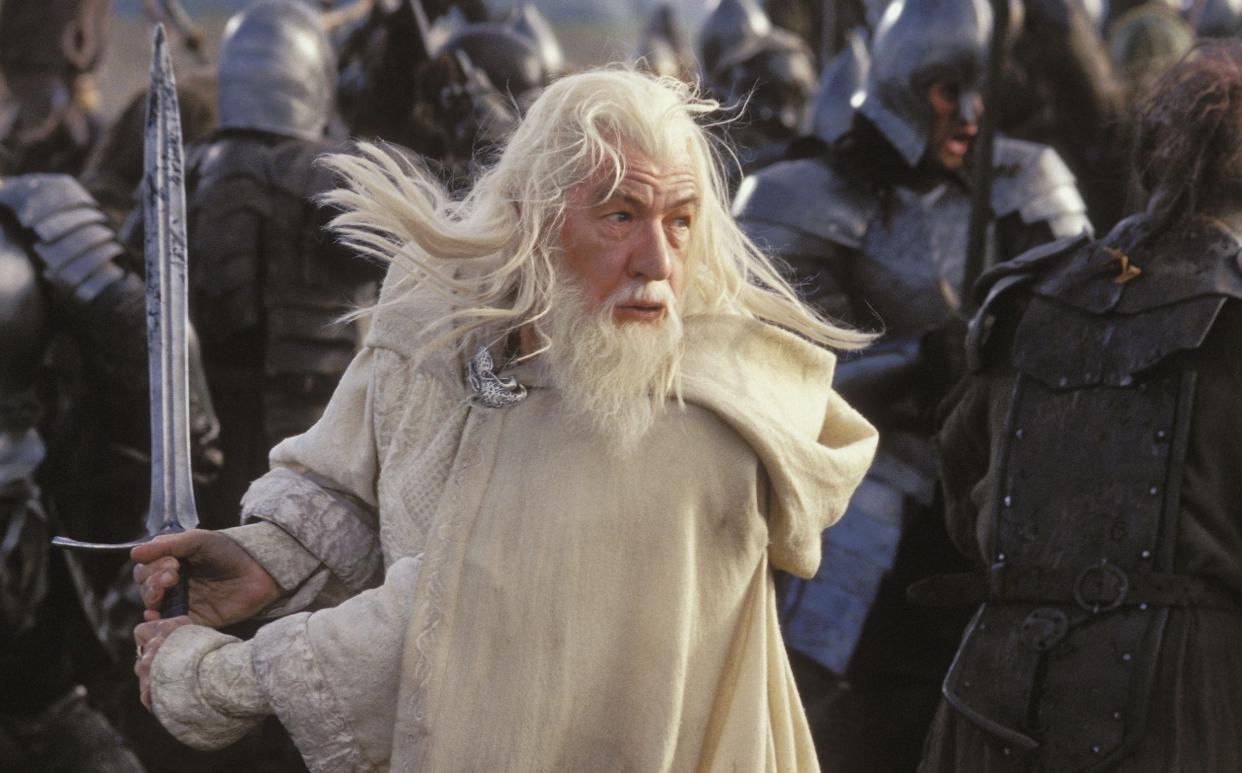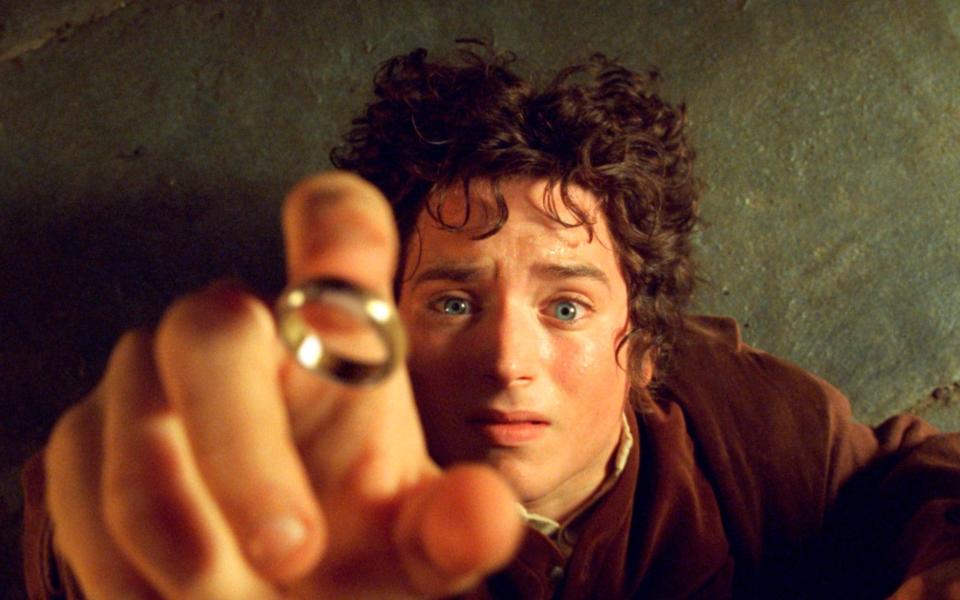How the world misunderstood Tolkien, the ultra-Tory

- Oops!Something went wrong.Please try again later.
Leaving aside the great monotheistic scriptures, the Bible and the Koran, and the effectively religious texts of Mao Tse-tung, JRR Tolkien’s The Lord of the Rings is the most popular book in the history of publishing. The usual estimate is that Tolkien’s masterpiece has sold around 150 million copies.
The only work of fiction that may have outsold it (according to a careful review of the admittedly patchy data) is Charles Dickens’s A Tale of Two Cities. But The Hobbit is not far behind (100 million). And Peter Jackson’s three-movie adaptation of The Lord of the Rings has made nearly $3 billion.
In short, Tolkien is very, very popular. Modern writers don’t get more popular. Not even JK Rowling.
There is, nevertheless, a puzzle. Why, if his books are so immensely popular, has Tolkien’s deep-rooted conservatism had such a tiny influence? For nearly all Tolkien’s millions of readers seem to have overlooked the fact that the great edifice of his fiction stands on a foundation of profoundly Tory philosophy.
Now, I was a Tolkien fan long before anyone thought to categorise me as a “conservative” historian. (As it happens, I am not a member of the Conservative Party, nor am I a registered Republican. But I am certainly well to the right of most academics these days and I have stopped arguing about the label.)

As a boy, I read and re-read The Hobbit and The Lord of the Rings. They have been a core part of the education of my five children. At the tender age of two, my third son Thomas responded with complete fascination when I first introduced him to Bilbo Baggins and his adventures. At six, he immersed himself in the spellbinding audio version recorded in the 1990s by the Australian-born actor Rob Inglis. We are now watching the films together, though I rather disapprove of them.
Middle Earth’s influence extends far beyond Oxford, where Tolkien spent most of his life. Silicon Valley, the part of California where I now live, is full of Tolkien enthusiasts. The technology investor Peter Thiel named one of his funds after mithril, Tolkien’s fictional metal. A palantir is a kind of crystal ball in Middle Earth; it is also the name of Alex Karp’s pioneering big-data company, which used to hand out “Save the Shire” T-shirts to visitors.
Yet this is a strange kind of influence. For I feel sure that Tolkien himself would have been revolted by Silicon Valley, just as his son and literary heir Christopher was appalled by the commercialisation of his father’s work. “Tolkien has become a monster,” he told Le Monde in 2012, “devoured by his popularity and absorbed by the absurdity of the age.”
A devout Roman Catholic who preferred the mass in Latin and looked down on his friend CS Lewis’s Protestantism, a tweed-clad Oxford don who despised central heating and abhorred the advance of the automobile, a pipe-smoking reactionary who refused to touch French cuisine or visit the United States, JRR Tolkien was a little Englander to the point of self-parody.

In prosperous old age, he crossed a cheque to the Inland Revenue with the words “Not a penny for Concorde.” Even the Norman Conquest struck him as a contamination of his country’s Anglo-Saxon essence.
Clearly, as John Garth argues in Tolkien and the Great War (2003), the harrowing experience of the Somme was formative. Tolkien served with the 11th Lancashire Fusiliers and took part in that terrible battle.
He called the experience of the trenches “animal horror” and lamented “the utter stupid waste of war”. However, Tolkien’s idealisation of the bucolic “Shire,” the home of his very English heroes, and his loathing of the industrial-totalitarian Mordor, located in the east of Middle Earth, were based on more than that.
Though Tolkien himself dismissed all attempts to find contemporary meaning in The Lord of the Rings (“I dislike allegory wherever I smell it,” he once said), his letters to his sons were revealing. Tolkien hit on the title The Lord of the Rings in 1938, about the time of the Munich agreement. He was contemptuous of Hitler – referred to variously as “that ruddy little ignoramus” and “a vulgar and ignorant little cad” – but much more suspicious of Stalin.
As war drew near, Tolkien reflected that he had “a loathing of being on any side that includes Russia” and believed that Stalin was “probably ultimately far more responsible for the present crisis and choice of moment than Hitler”.
Tolkien was a Germanophile for whom Hitler represented a hideous perversion of a Gothic ideal he held dear. “People in this land,” he wrote to his son Michael in 1941, “seem not even yet to realise that in the Germans we have enemies whose virtues (and they are virtues) of obedience and patriotism are greater than ours in the mass. Whose industry is about 10 times greater. And who are – under the curse of God – now led by a man inspired by a mad, whirlwind, devil: a typhoon, a passion: that makes the poor old Kaiser look like an old woman knitting.”
Tolkien was first and foremost a linguist and philologist of exceptional ability. But the spirit that infused his work was so conservative that, if he were still alive today, he would be no-platformed on every campus in the land. “I am not a ‘democrat’,” he once wrote, “if only because ‘humility’ and equality are spiritual principles corrupted by the attempt to mechanise and formalise them, with the result that we get not universal smallness and humility, but universal greatness and pride, till some Orc gets hold of a ring of power – and then we get and are getting slavery.”

Tolkien even defended deference, modelling the character of Sam Gamgee on the batmen he had met during the Great War. “Touching your cap to the squire may be damn bad for the squire,” he once remarked, “but it’s damn good for you.” The central storyline of both The Hobbit and The Lord of the Rings is of a pilgrimage, full of trials, tribulations and temptation, not to mention self-sacrifice. The books are only multiracial in the sense that there are hobbits, elves and dwarfs as well as men. (Yes, men. In Middle Earth, almost the only females we encounter are elfin princesses.)
In July 1944, he looked towards the post-war era with characteristically Tory misgivings, precisely because the victory he foresaw would be a victory shared with “our dear old friends the USSR” (this was ironic) and “Americo-cosmopolitanism.”
“When it is all over,” he asked Christopher, “will ordinary people have any freedom left (or right) or will they have to fight for it, or will they be too tired to resist? The last rather seems the idea of some of the Big Folk. Who have for the most part viewed this war from the vantage point of large motor-cars. Too many are childless. But I suppose the one certain result of it all is a further growth in the great standardised amalgamations with their mass-produced notions and emotions.”
As for the swing music that had done so much to divert the troops on all sides, Tolkien loathed it. “Music will give place to jiving, which as far as I can make out means holding a “jam session” around a piano (an instrument properly intended to produce the sounds devised by, say, Chopin) and hitting it so hard that it breaks.

This delicately cultured amusement is said to be a “fever” in the USA. O God! O Montreal! O Minnesota! O Michigan! What kind of mass manias the Soviets can produce remains for peace and prosperity and the removal of war-hypnotism to show. Not quite so dismal as the Western ones, perhaps (I hope).”
For Tolkien, the expansion of state power necessitated by the war had created profoundly dangerous tendencies in England, too. “You can’t fight the Enemy with his own Ring without turning into an Enemy,” he told his son, “but unfortunately Gandalf’s wisdom seems long ago to have passed with him into the True West.” (the land of the gods, in Tolkien’s made-up mythology).
We are left with a profound paradox. The most popular author of modern times filled our imaginations with unforgettable characters and landscapes – and yet seems largely to have failed to instil in us an iota of his ultra-Tory principles. To adapt a famous phrase from the war during which so much of The Lord of the Rings was written: never in the field of English literature was so much misunderstood by so many.
Great Lives: JRR Tolkien, creator of The Hobbit, is on Radio 4 and BBC Sounds on December 7

